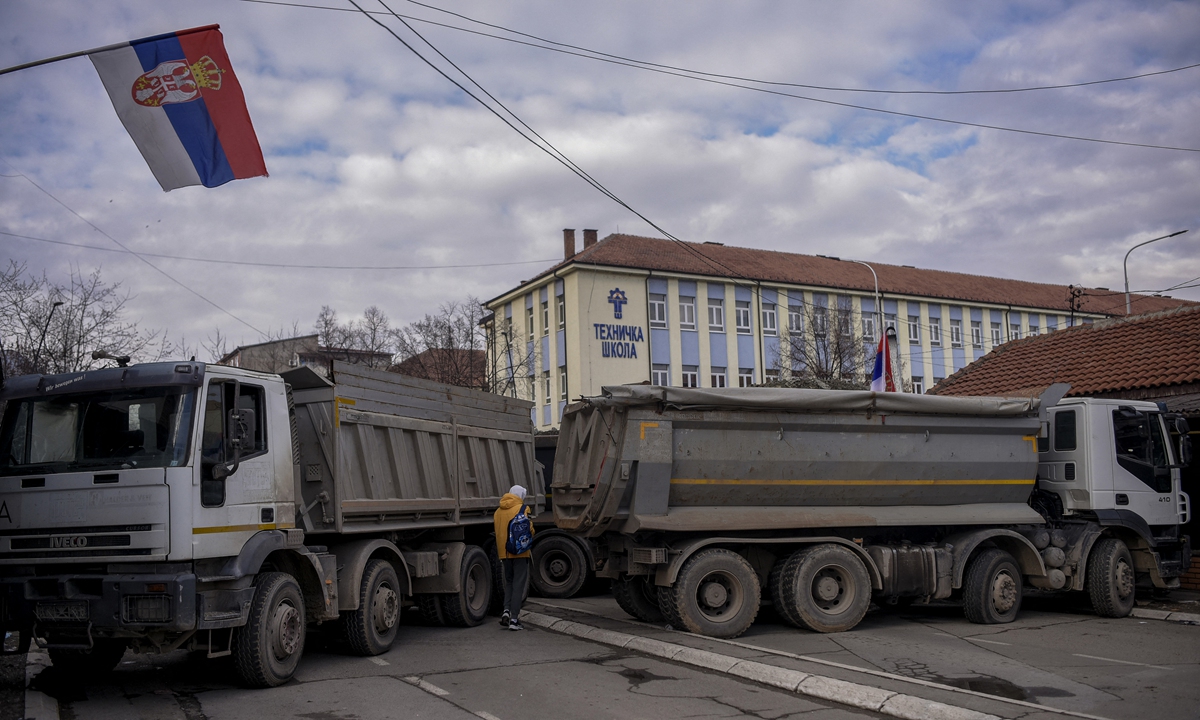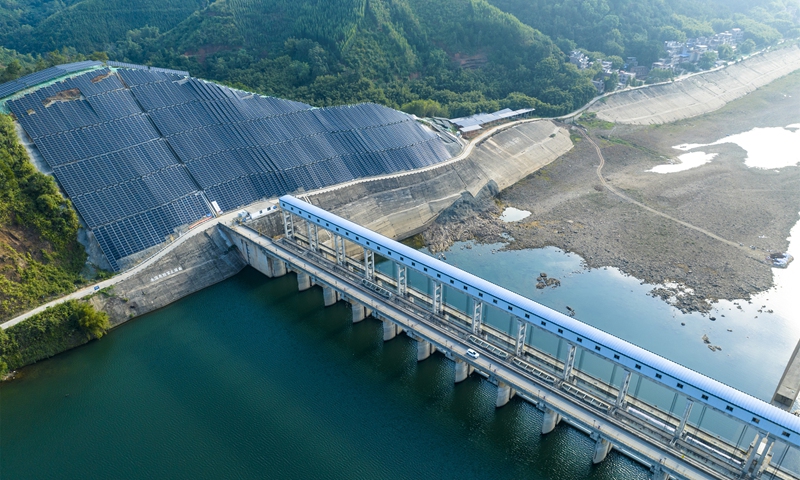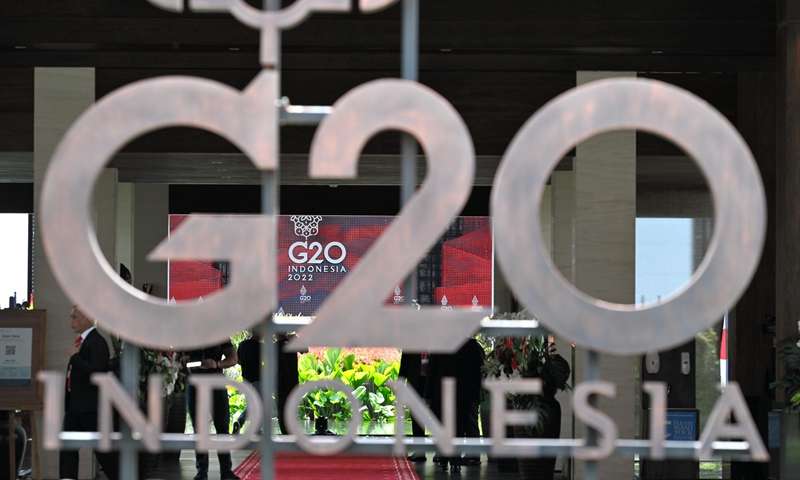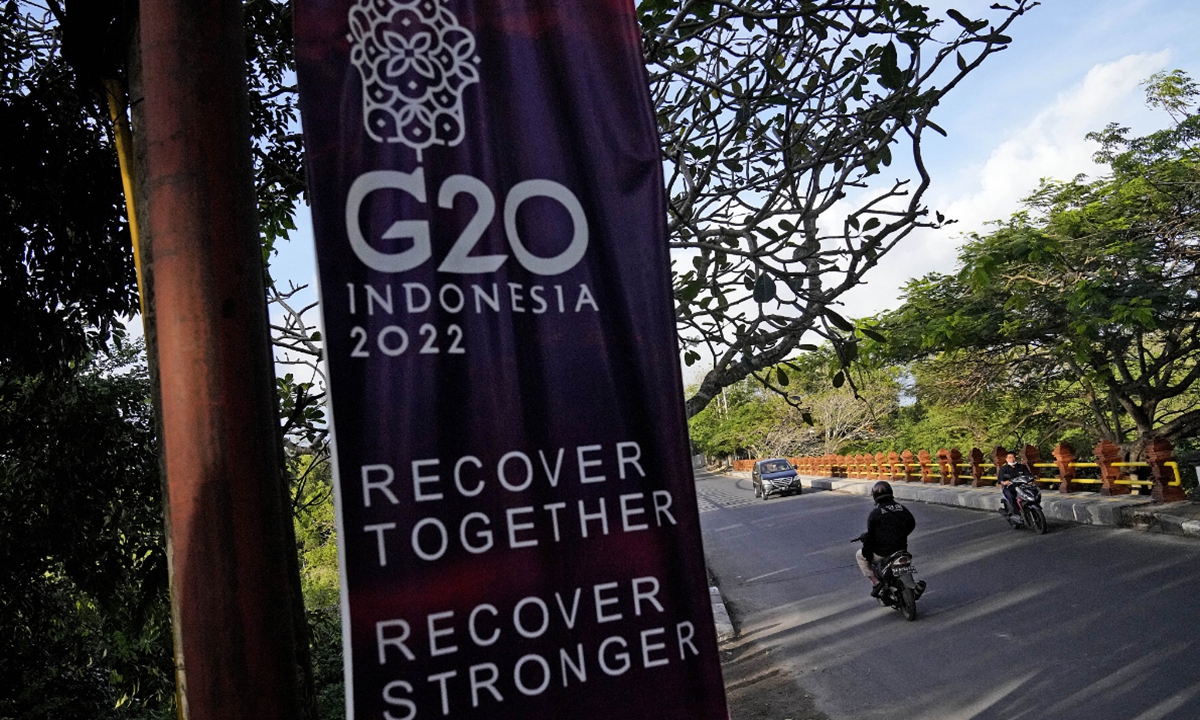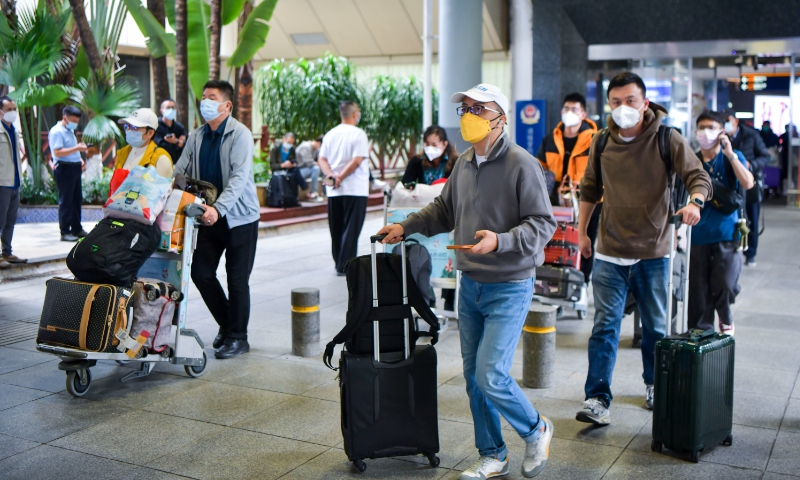Braving the waves. Illustration: Liu Rui/GT
2023 is coming, and its mast tip has emerged from the sea level. This represents more of a hope for the world that has experienced various uncertainties, crises, and changes in 2022. For both China and the world, 2022 is destined to be marked in a unique position. As the time comes to a new junction, people are faced with another choice and test on how to make the future better.
The overlapping effects of changes unseen in a century and a once-in-a-century pandemic reached a phased peak in 2022. Climate disasters, geopolitical tensions and confrontations, soaring food and energy prices, a sluggish economic recovery - a series of crises in both traditional and non-traditional security areas put world history again at the crossroads of turmoil or stability and recession or prosperity. The sudden outbreak of the Russia-Ukraine conflict is the biggest "gray rhino" event. It is a consequence of the long-term US and Western push for bloc security and camp confrontation in Europe, and its spillover effects are still profoundly evolving. Today, more than 30 years after the end of the Cold War, it offers a sober reminder again for the world that security has become problematic and development has been threatened on this planet.
If 2022 is a mirror, it probably reflects the world's confusion, perplexity and hesitation at a new junction. This is also the current state of many countries in the world. Needless to say, 2022 has been a difficult year for China as well. From external changes and impact of the epidemic to the economic slowdown, there was no challenge that can be easily tackled. Even at this moment, many Chinese people are still fighting COVID-19. But China is a major power that knows best where it stands and where it's headed. The report to the 20th National Congress of the Communist Party of China contains both clear guidance on which direction to go and specific planning framework. The clarity of policy and stability in the medium and long term is obviously a crucial institutional advantage today, giving the Chinese people the courage and confidence to enter 2023.
At the crossroads of history, should we build bridges and pave roads or build high walls and deep fortifications? Should we choose win-win cooperation or a zero-sum game? Different choices lead to different fates.
In 2022, absurd theories like the "New Cold War" and "global NATO" emerged one after another in the US and the West, and obsolete concepts such as hegemonism and power politics have revived. However, this has inspired people to cherish peace and attach importance to development. The urgency of global challenges has forced countries to cooperate, and the unilateral manipulation of "decoupling and breaking chains" has accentuated the significance of multilateralism. Under the shadow of the war and the pandemic, the success of the Beijing 2022 Winter Olympic Games and the Qatar World Cup not only made people feel the charm of sports but also offered the world a warm and healing embrace, showing the great power of peace and unity.
The more turbulent the world is, the more we need the power to put people at ease. It has become a strong voice of the times that we need peace rather than war, development rather than recession, openness rather than isolation, and cooperation rather than confrontation. In his 2023 New Year's message, UN Secretary-General António Guterres said that "in 2023, we need peace, now more than ever."
Where is the new path for peace and development? The world is still exploring. But solutions offered by China are being recognized by many countries around the world. In April, the Global Security Initiative proposed by Chinese President Xi Jinping at the opening ceremony of the Boao Forum for Asia Annual Conference 2022 aroused widespread resonance in the international community and has been regarded as a powerful weapon to defend the shared values of all humankind. This initiative, together with the Global Development Initiative proposed by President Xi in September last year, will serve as an international public good and shine even brighter in the world in 2023.
It is foreseeable that the year 2023 will not be easy either. China is facing the new challenge of better coordinating epidemic prevention and control with economic and social development. It still needs to continue to overcome all the difficulties on the way. And the world is hovering on the edge of war and peace and the light at the end of the tunnel has yet to appear.
However, we can still be full of new expectations for the world, because, under its imperfect performance, an upward growth force has broken through the ground - that is the earnest expectation for a better life, the powerful voice for fairness and justice, and the firm pursuit of win-win cooperation. Unremitting down-to-earth striving is the bridge to the future.
The times are catching up. China has taken a big test in 2022, which made us stronger and more determined. We kept marching forward while biting the bullet. Navigating through wind and storm, we never stopped. As the new year's bell is about to ring, we embrace 2023 with open arms, expecting it to become a new year for China to "roll up our sleeves and work hard" and provide the world with an inexhaustible supply of positive energy.
Source link
The righteous path of mankind lies in Great Unity
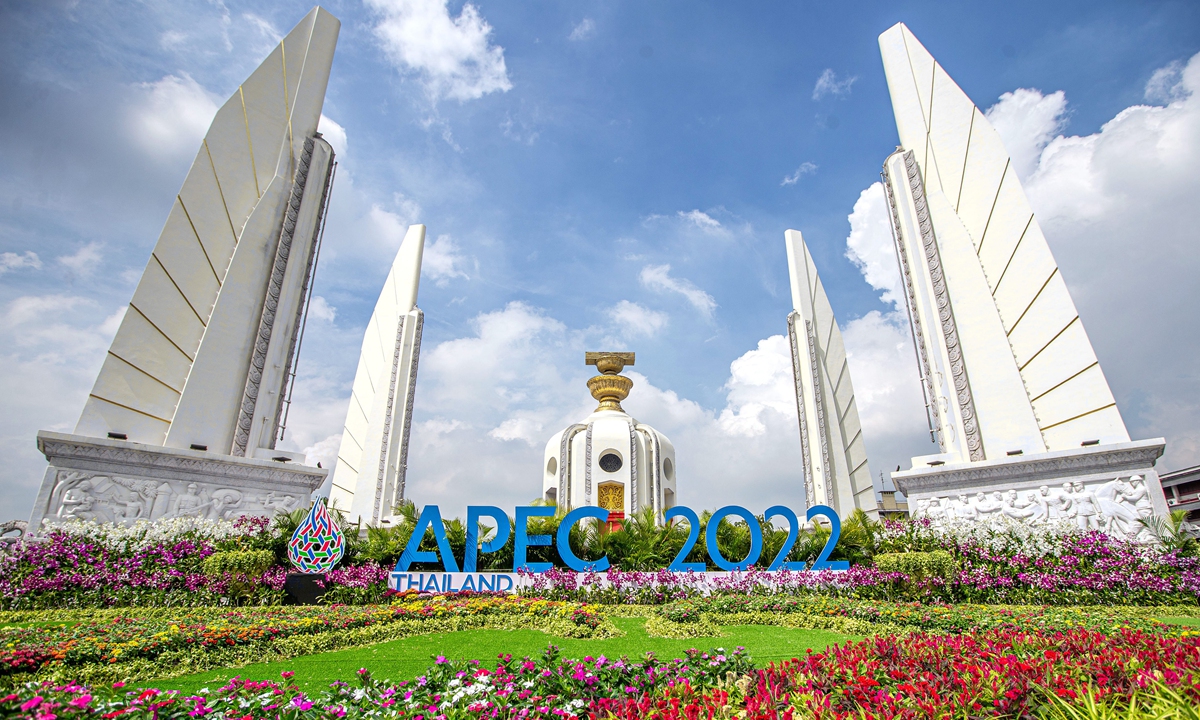
This picture taken on November 16, 2022 in Bangkok shows signage for the Asia-Pacific Economic Cooperation (APEC) summit. Photo: Xinhua
The world in 2022 is not peaceful: War began on the European continent, the COVID-19 pandemic has not ended, global food and energy problems have become prominent, and the world economic recovery is stumbling. What is presented to the world unprecedentedly is a profound change in the world, the times and history.
The ongoing Russia-Ukraine conflict is a brutal extension of the post-Cold War global geopolitical reality. Abnormal terms from the US and the West, including the "global NATO," "parallel world," and "new iron curtain," emerged. Concepts that should die out, such as the Cold War thinking, bloc confrontation, and power politics, took the opportunity of the chaos to rise up. In the third decade of the 21st century, 30 years after the end of the Cold War, turmoil and crisis alerted the world to the fact that security is facing problems and development is being threatened on this planet.
"Security is the precondition for development and humanity are living in an indivisible security community," said Chinese President Xi Jinping in April this year when he solemnly put forward the Global Security Initiative at the Boao Forum for Asia Annual Conference 2022, providing the international community with practical new ideas and paths for jointly maintaining world peace and security.
"Global development would be impossible without a peaceful and stable international environment," noted President Xi in November in a discussion about the Global Security Initiative at the 17th G20 Leaders' Summit. He profoundly clarified the importance of security for development and promoting a more inclusive, universal and resilient global development.
With the wisdom of the East and the vision of China as a great nation, the Global Security Initiative is connected to the well-being of humankind. It focuses on sore points in security, reflecting the global consensus and arousing universal resonance.
Risky, peculiar situation in great changes unseen in a century
The Russia-Ukraine conflict, which has dragged on for 10 months, has severely depleted the strategic resources of both sides and produced incalculable spillover effects.
Statistics show that energy and food prices in the Eurozone continue to climb, with the annual inflation reaching 10.7 percent in October, a record high. The Russia-Ukraine conflict has caused global food shortages and soaring commodity prices outside Europe. Many developing countries have fallen into extreme poverty and hunger, and the specter of bankruptcy and unrest is hovering above them.
Achieving peace is not only a humanitarian pursuit, but also a key to sustaining global economic recovery and growth. In the face of the Russia-Ukraine conflict, China always stands on the side of peace and justice and decides its position and policy based on the merits of the matter. It has been actively promoting peace talks in its own way.
In a phone conversation with German President Frank-Walter Steinmeier on December 20, President Xi stressed that China stays committed to promoting peace talks and believes that a protracted and complicated crisis is in no parties' interests. China supports the EU in demonstrating its strategic autonomy and in leading the establishment of a balanced, effective and sustainable European security architecture to realize enduring peace and long-term stability in the European continent.
To put out the flame, not fan it - this is the consensus and expectation of most countries. However, contrary to the general vision of the international community, the US and NATO so far have no intention to put an end to the conflict. On December 20, the US House of Representatives announced the Additional Ukraine Supplemental Appropriations Act, 2023, to provide $45 billion in emergency funding to support Ukraine. This will be the largest US aid to Ukraine to date, far exceeding the $37 billion aid requested by the White House to Congress in November.
After the outbreak of the Russia-Ukraine conflict, NATO members agreed to invite Finland and Sweden to join the alliance. They have also taken a series of measures to transform and strengthen their organization. This created a "collective fear" about the security of Europe and even the world. NATO, which was already showing signs of being "brain dead," was able to "resurrect" and strengthen.
The essence of the ongoing Russia-Ukraine conflict is precisely the outburst of geopolitical conflicts between Russia and NATO that have long accumulated after the Cold War. Fundamentally, this is the evil consequence that US' Cold War thinking and hegemonic policies have resulted in. NATO's constant expansion and long-term containment of Russia triggered the Russia-Ukraine conflict.
Shining a light of hope from security predicament
The US and Western countries have long been clinging to hegemonic thinking and ideological barriers, which are against the general development trend of the times and are the source of the current crisis and chaos of the world.
Facing the crisis and chaos three decades after the end of the Cold War, the world needs a calm and profound reflection.
Faced with the spread of violence and conflicts, rampant terrorism, global pandemic, and the threat of nuclear war and annihilation, no country can stand alone. History and reality have repeatedly shown us that there is neither a paradise of absolute security in the world, nor is there an isolation from the security of the world. No country can seek its own absolute security by itself, and no country can recover and stay stable from the turmoil in other countries.
Abandoning hegemony and confrontation and pursuing peace and development are the well-being of all mankind. It is for this reason that the vision of a community with a shared future for mankind put forward by the Chinese leader is hailed as "the only future for humanity on this planet"; the Global Security Initiative advocating joint maintenance of world peace is regarded as a "powerful weapon to defend the common values of all mankind."
Security is the most basic and universal appeal and desire of all human beings, and the basic prerequisite for human survival and development.
The Global Security Initiative is another international public product provided by China in the field of global governance, and it will lead human society with a clear path to a world of lasting peace and universal security.
Reflection on security under hegemonic dominance
Since the beginning of 2022, when the US' Biden administration passed the Inflation Reduction Act to implement a discriminatory subsidy policy, and when the US-led NATO pursued absolute security and Russia counterattacked, the negative effect of hegemony on security has been clearly exposed to the world - the old historical dream of American hegemony runs counter to the general trend of the era of peaceful development and win-win cooperation.
The root cause is that the US ignores the security and development needs of other countries, ignores the development and changes of the international pattern, and is obsessed with maintaining its own hegemony and the "center-periphery" international political and economic structure. In this structure, Western countries with the US as the head are at the core, while non-Western countries are permanently squeezed out to the periphery.
This is also the root of the security dilemma in today's world: the US and the West are continuing their hegemony, ignoring or even suppressing the rise of the non-Western world as a whole, and are extremely selfish in dealing with international security issues.
The so-called "the US and the West representing the world" is destined to be a geopolitical fantasy. Most countries reject the democratic narrative peddled by the US and the West, and even more refuse to choose sides in the great power competition promoted by the US.
The clamor to "change China's environment" is just the wishful thinking of the US. At this year's Shangri-La Dialogue, the Asia-Pacific countries' "suppression" of China that the US had expected completely came to nothing. Indonesian Defence Minister Prabowo Subianto in his speech urged countries to respect China's "rightful rise back to its position as a great civilization."
Being obsessed with "containing China's influence" will lead to nothing. A few days ago, the US hosted the US-Africa Leaders Summit again after eight years. Anyone with a discerning eye can see clearly that this summit is exactly the same as the US-ASEAN Special Summit held earlier this year, the 9th Summit of the Americas, or the US-Pacific Island Country Summit, which are to suppress China's influence. This seems to have become the focus of the US' diplomacy, but is doomed to futility in the face of real Chinese contributions.
In the world's pursuit of common security and common development, the hegemonic rhetoric of the US has failed.
Using security challenges and "China threat" as a gimmick will not restore the credibility and influence that the US has lost during its decades of hegemony. The vast majority of countries in the world will not disregard peaceful development.
What all countries need is a real peace dividend, and they hope to find a rational balance between security and development. In the face of the US, which insists on turning the Pacific Ocean into a "battlefield of great powers," countries in the region worry about it and refuse to "dance" with the US.
Seek the way of Great Unity with the heart for the world
The recent FIFA World Cup held in the Middle East was full of excitement, and so were the eye-catching "triple summits" - the China-Arab States Summit, the China-Gulf Cooperation Council Summit and the China-Saudi Arabia Summit.
As China's largest and highest-level diplomatic action to the Arab world since the founding of the People's Republic of China, it reflects the strategic choice of China and Arab countries to strengthen solidarity and coordination amid global challenges.
From the Shanghai Cooperation Organization summit in Samarkand, the G20 summit in Bali, the Asia-Pacific Economic Cooperation meeting in Bangkok to the latest "triple summits," during President Xi's three overseas visits around the 20th CPC National Congress, he met bilaterally with leaders of more than 40 countries, promoting the Chinese belief of solidarity, cooperation, mutual benefit and win-win to the world.
From jointly promoting the Belt and Road Initiative (BRI) to building a community with a shared future for mankind, from putting forward four-point proposal regarding escalating Palestine-Israel conflict, proposing a five-point initiative on achieving security and stability in the Middle East, to putting forward the "Initiative of Peaceful Development in the Horn of Africa," China coordinates security and development in line with new changes around the world and cope with new challenges, and continue to enrich and develop solutions to world security issues.
The Global Security Initiative put forward by Xi takes the new vision on security as the guiding principle, mutual respect as the fundamental requirement, indivisible security as the important principle, and building a security community as the long-term goal, in order to foster a new type of security that replaces confrontation, alliance and a zero-sum approach with dialogue, partnership and win-win results.
Since its founding, the People's Republic of China has never initiated war and has always been a builder of world peace. China firmly upholds the purposes and principles of the UN Charter and has always been a defender of the international order. The country has always been a mediator on hot issues: seeking solutions to the Ukraine crisis, the Palestinian issue, the Korean Peninsula nuclear issue and the Afghanistan issue.
By promoting the implementation of the BRI and leveraging such platforms as the Regional Comprehensive Economic Partnership (RCEP), China has injected vitality into global economic stability and recovery, and remains a provider of international public goods.
The Global Security Initiative and the Global Development Initiative proposed by Xi in 2021 complement each other. They echo the trend of the era for peace, development, cooperation and mutual benefit, coordinate security in both traditional and non-traditional fields, seek the "greatest common divisor" and draw the "greatest concentric circles" in the international community, and provide new support for the security and development of all countries.
The righteous way of the world lies in Great Unity.
Source link
RELATED ARTICLES
People around the world will celebrate 2023 in a few days with hope and new plans. Peace is ...
In early October, as the 2022 World Team Table Tennis Championships in Chengdu, Southwest China's Sichuan Province came ...
Related posts:
China - World Leader. Share all facts about
China and discuss how China leads in key areas globally. .


 This picture taken on November 16, 2022 in Bangkok shows signage for the Asia-Pacific Economic Cooperation (APEC) summit. Photo: Xinhua
This picture taken on November 16, 2022 in Bangkok shows signage for the Asia-Pacific Economic Cooperation (APEC) summit. Photo: Xinhua
